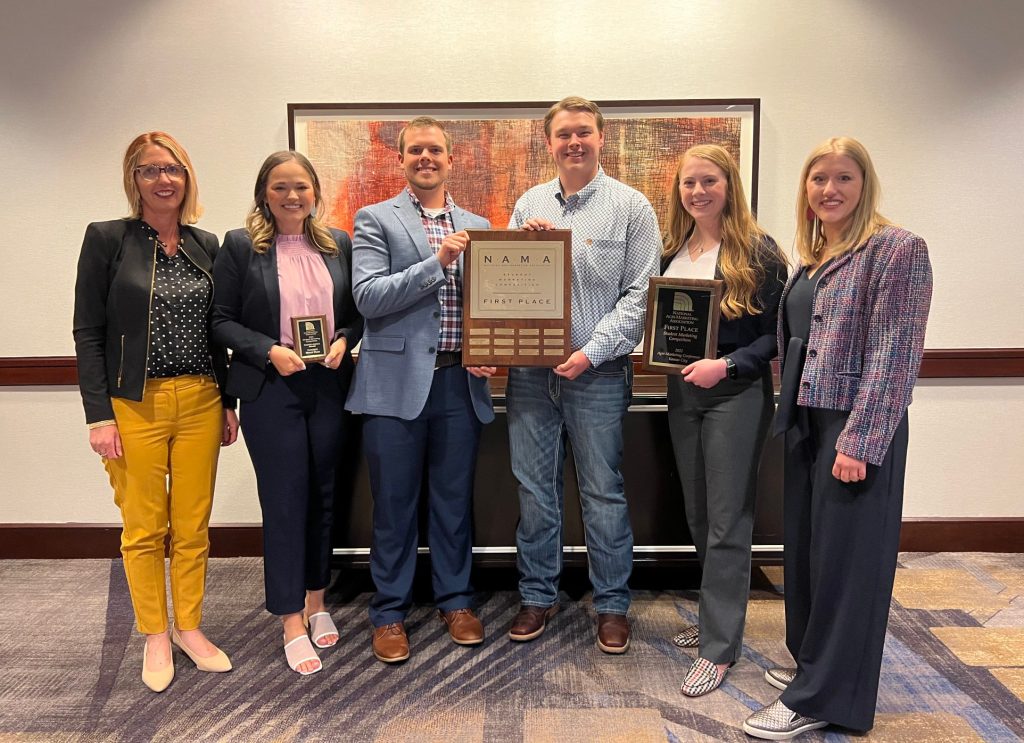
Last year, the Mizzou National Agri-Marketing Association (NAMA) team placed fourth during NAMA’s National Student Marketing Competition — the first time Mizzou NAMA had made it to the final round of the national competition in more than 10 years.
This year, Mizzou took home top honors.
Their first-place presentation centered on the GerriRig Grain Management System, a product the team modeled after the Grain Weevil, a grain bin safety and management robot. MU competed against more than 20 teams in early April during NAMA’s annual Agri-Marketing Conference.
“When we began this project, our primary goal was to be remembered,” said Kate Thompson, senior agribusiness management major and president of Mizzou NAMA. “It didn’t matter how we finished on the podium because when we walked off stage and into the hallway after our final presentation we instantly burst into tears of joy and started hugging each other — we knew we left it all on the stage. I will never forget that feeling. When we found out we got first place, the contest chair told us that not only was this her favorite pitch in 25 years, but we had set the bar for future years.”
Last year’s event was held virtually, with students returning for in-person competition at this year’s event. Thompson said the student marketing competition consists of two parts: a written executive summary and live presentation. From January to April, the team worked extensively on the executive summary, a detailed business and marketing plan which includes a market analysis, business proposition, action plan and financial analysis.
Mizzou’s GerriRig Grain Management System idea was created to help grain farmers manage their grain bins, with a focus on farmer safety.
“We competed in the live presentation portion of the contest at NAMA’s annual marketing conference, along with our written summary, which the judges read in advance,” Thompson said. “We competed in the preliminary round, semifinals and final round, with an ultimate finish of first place and favorite finals team as voted on by students.”
Along with Thompson, Halley Blades (junior, food science and nutrition); Zak Bush (junior, agribusiness management); Drew Kientzy (senior, agribusiness management); Mattie Kottman (senior, agribusiness management); Sophia Liefer (junior, plant sciences); Regan Ragsdale (senior, agribusiness management); Lauryn Robnett (junior, agribusiness management); Anderson Rogers (junior, agribusiness management) and Sydney Stundebeck (sophomore, agribusiness management) prepared Mizzou’s presentation. Thompson, Blades, Bush, Kientzy and Ragsdale presented at the national competition.
Annette Kendall, senior technology transfer manager – marketing, Technology Advancement Office, and Katie Essing, assistant teaching professor, Trulaske College of Business, serve as advisors for Mizzou NAMA.
In addition to the team’s first-place finish, Ragsdale took first place in the Sales Competition.
“The sales contest pairs real companies with real scenarios and allows students in the contest to problem solve,” Ragsdale said. “This contest was a great picture of what my future career in agriculture sales will look like. I’m grateful to have won, but even more excited I had the opportunity to learn and be challenged through NAMA.”
The Mizzou NAMA team touches on experiential learning, a key part of the RISE Initiative. The RISE Initiative states that all CAFNR undergraduate students will take part in at least one signature experience while on campus: Research, International, Service Learning and Experiential Learning. Experiential learning offers students real-world learning experiences outside of the classroom, through industry engagement, internship programs and learning laboratories.
According to their website, NAMA is an organization for agri-marketing professionals and for over 60 years has provided education and insights that position NAMA members for success and equip them to deliver greater value for their companies and employers in a rapidly changing world. NAMA gives more than 3,500 college students and professional members in the food and fiber industry access to solutions and opportunities. With 23 chapters in six regions across the country, NAMA helps members grow their agribusiness careers locally and nationally.
“I would encourage anyone interested in the agriculture marketing space to come and talk to one of us on the Mizzou NAMA team,” Thompson said. “The connections and memories you make will last a lifetime.”